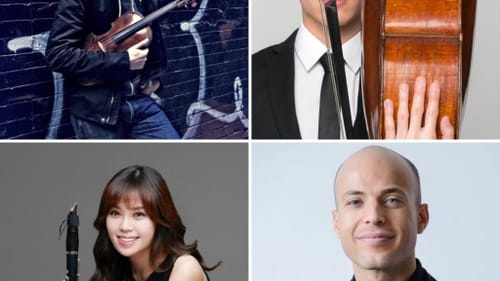Stay in the Loop
BSR publishes on a weekly schedule, with an email newsletter every Wednesday and Thursday morning. There’s no paywall, and subscribing is always free.
Music beyond time and space
Princeton University Concerts presents Olivier Messiaen’s ‘Quartet for the End of Time’
The premiere took place January 15, 1941, outdoors in the freezing rain, audience and musicians alike in a state of semistarvation. The site was a prisoner-of-war camp in Görlitz, Germany, where Olivier Messiaen, a French soldier and keyboard musician, was a captive. Nazis had imprisoned three other professional musicians there as well. A sympathetic guard who loved music had allowed the young pianist to have music paper, a pencil, and a private place to work. The result was not only the birth of a musical legend bordering on myth, but of one of the greatest works of religious music ever created: Messiaen's Quartet for the End of Time.
Today, nearly 80 years later, a performance of Messiaen's groundbreaking quartet is a major musical event wherever it occurs. In early February, that was Princeton University — where geniuses such as Einstein and Feynman contemplated eternity and challenged the existence of time and space.
Awesome mysteries
In this offering from the always exciting and provocative Princeton University Concerts, four extraordinarily talented artists offered two consecutive performances of the 50-minute work to sold-out audiences on February 6. The performance was supported by imaginative staging that used light and its absence to reveal the work's deep exploration of spirituality, a kind of via negativa through the human soul.
The eight-movement quartet is oddly scored for clarinet, violin, cello, and piano, to fit the skills and instruments available at the Stalag VIII-A camp. In the early years of World War II. The work was inspired by the Revelation of St. John the Divine, the last book of the Christian Bible, specifically chapter 10, which depicts an angel announcing the end of time. Anyone who has dipped a toe into the theory behind quantum mechanics knows that you don't have to be a person of faith to believe that time is an awesome and perhaps unknowable mystery. But Messiaen was a devout Catholic, and the biblical apocalypse was good enough for him.
An intimate experience
The quartet is an intense and earnest work, requiring the utmost sensitivity in its presentation. The program described it as a "concert experience" by Michael Dean Morgan and Wesley Cornwell (the latter designed the transcendent lighting that plunged the performance into its introspective mood).
The audience sat in folding chairs on the perimeter of the stage, so close to the musicians I could read the score on violinist Stefan Jackiw's music stand. Perhaps this is as close as a modern audience can comfortably be to the conditions of the premiere, where 400 prisoners and guards listened in rapt silence. As the moment neared for the concert to begin, the overhead lighting dimmed until there was nothing visible except the sheet music and residual light glowing in the faces of the young musicians: Jackiw; cellist Jay Campbell; clarinetist Yoonah Kim; and pianist Orion Weiss.

Chemical transformation
Each of the movements has a unique personality and highlights the musical language of each instrument and its relationship to one or more other instruments in the ensemble. In a sense, it is high opera, with arias, duets, and quartets telling, without words, an ancient tale of a future without time. Indeed, time signatures seem to fall and evaporate from the score.
Kim’s performance of the third movement, “Abyss of Birds,” for solo clarinet, explores instrumental possibilities I scarcely knew existed. Has a clarinetist ever held a note that long before, or with greater effect? At one point, I felt as though a sonorous note entered my right ear, transformed the grey matter in my brain, and exited in a blaze of fire through the left. This isn’t music: it’s chemical transformation.
At its premiere, those instruments were more or less broken, forming a colorful mosaic like the stained glass of churches, finding a wholeness in fragmentation. Here, fine instruments free of flaw glistened in the wounded light. While some movements contained brilliance and fire — such as the fourth, “Interlude,” which had the energy of a Middle Eastern marketplace — the two “Louange” (Praise) movements, number five and eight, articulated clearly the faith of Messiaen and all believers, whether in the divine or in the revelations of science.
If you’re unfamiliar with this work, there are plenty of places to listen online. Just be sure to listen by candlelight and with a receptive spirit, for it is a work that may change your life.
What, When, Where
Quartet for the End of Time, by Olivier Messiaen. Stefan Jackiw, violin; Jay Campbell, cello; Yoonah Kim, clarinet; Orion Weiss, piano. Concert designed by Michael Dean Morgan and Wesley Cornwell. Princeton University Concerts. February 6, 2019, at Richardson Auditorium of Alexander Hall on the Princeton University campus, Princeton, New Jersey. (609) 258-2800 or princetonuniversityconcerts.org.
Sign up for our newsletter
All of the week's new articles, all in one place. Sign up for the free weekly BSR newsletters, and don't miss a conversation.

 Linda Holt
Linda Holt